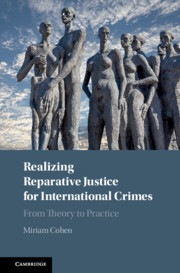Book contents
- Realizing Reparative Justice for International Crimes: From Theory to Practice
- Realizing Reparative Justice for International Crimes
- Copyright page
- Dedication
- Contents
- Foreword
- Acknowledgments
- Table of Cases
- Abbreviations
- Prologue
- Introduction
- 1 Punishment and Reparation
- 2 Reparative Justice at International and Hybrid Criminal Tribunals
- 3 The Construction of a Reparative Dimension of International Justice Before the International Criminal Court (ICC)
- 4 Victims of International Crimes Within Administrative Mechanisms
- 5 The Role of National Courts and Mechanisms in Realizing Reparative Justice for International Crimes
- 6 Conclusions
- Bibliography
- Index
3 - The Construction of a Reparative Dimension of International Justice Before the International Criminal Court (ICC)
Published online by Cambridge University Press: 16 June 2020
- Realizing Reparative Justice for International Crimes: From Theory to Practice
- Realizing Reparative Justice for International Crimes
- Copyright page
- Dedication
- Contents
- Foreword
- Acknowledgments
- Table of Cases
- Abbreviations
- Prologue
- Introduction
- 1 Punishment and Reparation
- 2 Reparative Justice at International and Hybrid Criminal Tribunals
- 3 The Construction of a Reparative Dimension of International Justice Before the International Criminal Court (ICC)
- 4 Victims of International Crimes Within Administrative Mechanisms
- 5 The Role of National Courts and Mechanisms in Realizing Reparative Justice for International Crimes
- 6 Conclusions
- Bibliography
- Index
Summary
Chapter 3 focuses entirely on the reparation system at the ICC. The purpose of this chapter is to engage in an in-depth discussion of the development of reparative justice at the ICC, from theory to practice. This chapter analyzes some of the key challenges that the court is facing or will likely encounter in dealing with reparative justice within the context of international criminal prosecutions and trials. This chapter is devoted to fully engaging with the issues emerging from adding a reparative dimension in a primarily criminal process and how the criminal and civil dimension are intertwined, since reparations are dependent upon criminal conviction, and how both dimensions are reconciled in practice by the court and how they should be reconciled in the future. It also aims to provide a timely and original in-depth discussion of the first four cases dealing with reparations, which will pave the way and lay the foundation for the reparation system at the ICC for years to come. These cases are: the first case before the ICC (The Prosecutor v. Thomas Lubanga Dyilo), which established principles of reparations, and its concrete impact for the development of reparations at the court; the case of the The Prosecutor v. Germain Katanga, which presented a unique set of issues, including individual reparations of a modest amount; the case of the The Prosecutor v. Al Mahdi, which presented original questions such as the concept of victims of cultural heritage; and the case of the The Prosecutor v. Jean-Pierre Bemba, which is close to being decided at the time of writing, and will present unique challenges for the adjudication of reparations by the ICC considering the high number of victims authorized to participate in proceedings (more than 5,000). This in-depth analysis of cases is original and precisely one of the factors that distinguishes this volume from previous books in the field. A comparison of this ground-breaking jurisprudence informs how the decisions of the court align and diverge on key issues, shed light on unique challenges the court is facing and provides room for some recommendations for future development, based on concrete experiences.
Keywords
- Type
- Chapter
- Information
- Realizing Reparative Justice for International CrimesFrom Theory to Practice, pp. 75 - 125Publisher: Cambridge University PressPrint publication year: 2020

